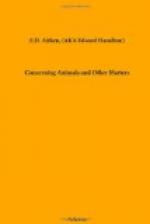It is a sufficiently terrible thought, however, that there are even four kinds of reptiles going silently about the land whose bite is certain death. If they knew their powers and were maliciously disposed, our life in the East would be like Christian’s progress through the Valley of the Shadow of Death. But the poisonous snakes are just as timid as the rest, and as little inclined to act on the offensive against any living creature except the little animals on which they prey. Even a trodden worm will turn, and a snake has as much spirit as a worm. If a man treads on it, it will turn and bite him. But it has no desire to be trodden on. It does its best to avoid that mischance, and, I need scarcely say, so does a man unless he is drunk. When both parties are sincerely anxious to avoid a collision, a collision is not at all likely to occur, and the fact is that, of all forms of death to which we are exposed in India, death by snake-bite is about the one which we have least reason to apprehend.
During a pretty long residence in India I have heard of only one instance of an Englishman being killed by a snake. It was in Manipur, and I read of it in the newspapers. During the same time I have heard of only one death by lightning and one by falling into the fermenting vat of a brewery, so I suppose these accidents are equally uncommon. Eating oysters is much more fatal: I have heard of at least four or five deaths from that cause.
The natives are far more exposed to danger from snakes than we are, because they go barefoot, by night as well as day, through fields and along narrow, overgrown footpaths about their villages. The tread of a barefooted man does not make noise enough to warn a snake to get out of his way, and if he treads on one, there is nothing between its fangs and his skin. Again, the huts of the natives, being made of wattle and daub and thatched with straw, offer to snakes just the kind of shelter that they like, and the wonder is that naked men, sleeping on the ground in such places, and poking about dark corners, among their stores of fuel and other chattels, meet with so few accidents. It says a great deal for the mild and inoffensive nature of the snake. Still, the total number of deaths by snake-bite reported every year is very large, and looks absolutely appalling if you do not think of dividing it among three hundred millions. Treated in that way it shrivels up at once, and when compared with the results of other causes of death, looks quite insignificant.
The natives themselves are so far from regarding the serpent tribe with our feelings that the deadliest of them all has been canonised and is treated with all the respect due to a sub-deity. No Brahmin, or religious-minded man of any respectable caste, will have a cobra killed on any account. If one takes to haunting his premises, he will propitiate it with offerings of silk and look for good luck from its patronage.




